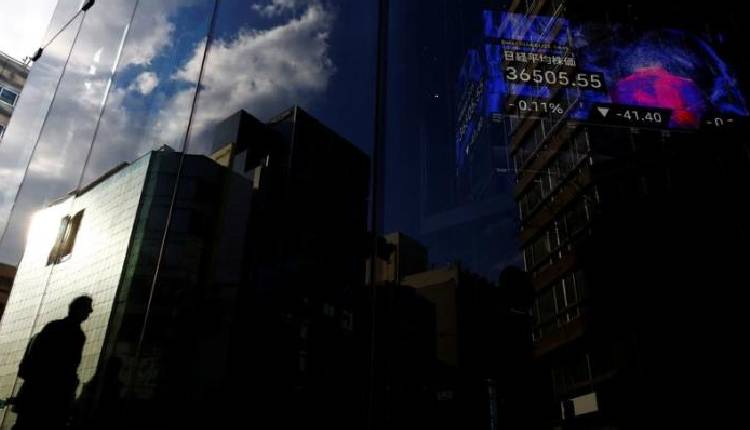Asian shares experienced a dip on Tuesday as Japanese inflation, which went marginally higher than anticipated, made investors cautious ahead of the upcoming price data from Europe and the US, Reuters reported. Meanwhile, bitcoin saw an increase, indicating interest from institutional investors.
The yen held steady at 150.50 against the dollar and slightly recovered from a three-month low against the euro. This happened as Japanese inflation met the central bank’s year-on-year target of 2 per cent, fuelling expectations of an end to negative rates by April.
Tokyo’s Nikkei barely achieved a new record high, ending just 0.01 per cent stronger, while the MSCI’s broadest index of Asia-Pacific shares outside Japan fell by 0.2 per cent, remaining under the seven-month high from last week. Brent crude futures stayed around $82.63 a barrel following reports of Hamas receiving a draft proposal for a 40-day ceasefire in Gaza.
The S&P 500 slightly inched down by 0.1 per cent, and Nasdaq, FTSE, and European futures each experienced a 0.2 per cent decline. On Thursday, the Federal Reserve is set to release its preferred inflation measure, the core PCE price index, which is expected to show a 0.4 per cent increase.
ANZ Bank analysts told Reuters that they predicted that if the core month-on-month reading matches expectations, it would be the highest since last February, aligning with the Federal Reserve’s message of patience.
Large auctions, $127 billion on Tuesday and $42 billion on Wednesday, caused rate concerns and put pressure on Treasuries, but yields stabilised during the Asian trading day.
The latest yields for ten-year US Treasuries dropped 1.4 basis points to 4.29 per cent, while two-year yields decreased 3 bps to 4.71 per cent.
The market now expects the Federal Reserve’s first easing to occur in June instead of May, with a current probability of around 70 per cent. Futures suggest just over three quarter-point cuts this year, down from five at the beginning of the month.
Currency trading in Asia was relatively calm, with the Australian and New Zealand dollars facing continued pressure. The Aussie hit a one-week low of $0.6525 due to falling iron ore prices, before slightly rebounding to $0.6547.
Traders also reduced bets on a potential interest rate hike by New Zealand’s central bank, pushing the kiwi to a week-low ahead of Wednesday’s meeting.
The euro remained at $1.0850, while the sterling slightly fell to $1.2676 as speculators reduced bullish stances. Bitcoin experienced a more than 3 per cent increase, surpassing $57,000.
This week, on Friday, the European Union will release inflation figures, with the core indicator expected to drop to its lowest since early 2022 at 2.9 per cent. This could bring the European Central Bank (ECB) closer to easing policy.
The market has almost fully priced in a first rate cut in June, with a 36 per cent probability for April. ECB President Christine Lagarde and Bank of Greece Governor Yannis Stournaras expressed caution about rushing into cuts in their Monday speeches.
Later on Tuesday, Bank of England Deputy Governor Dave Ramsden and Riksbank Governor Erik Thedeen will make appearances. A variety of mostly secondary US and European data, including consumer confidence for Germany, France, and the US, are due.


